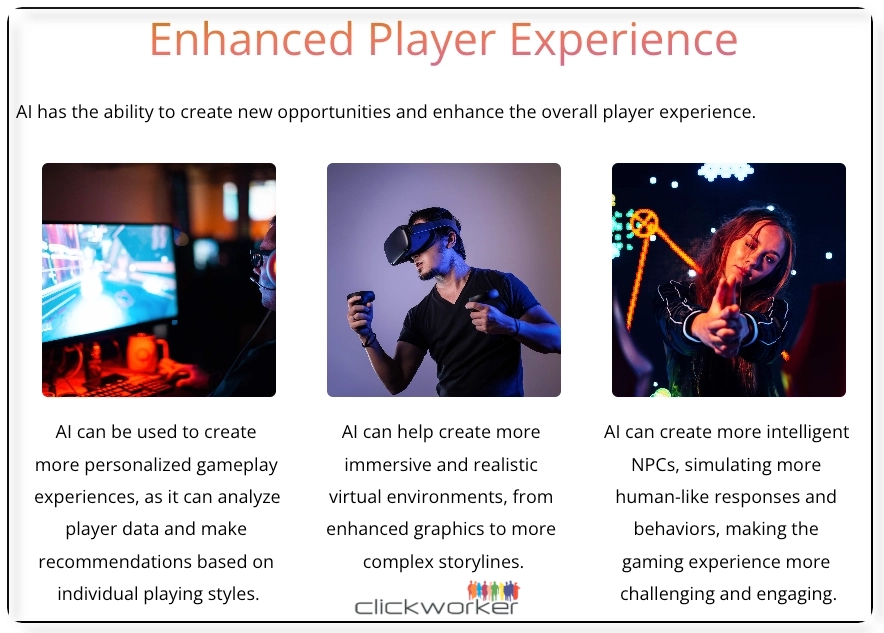BDP Engbu Insights
Your go-to source for the latest news and insights.
Crafting Playgrounds: How Player Experience Personalization Changes the Game
Discover how personalized player experiences are revolutionizing gaming. Dive into the future of play with our expert insights!
Understanding Player Experience Personalization: The Future of Gaming
The concept of Player Experience Personalization is rapidly transforming the gaming landscape, offering tailored experiences that cater to individual preferences. As technology evolves, players are no longer satisfied with one-size-fits-all gameplay; they crave an immersive environment where their choices matter and their gaming experience is unique. This shift is driven by data analytics and artificial intelligence, which allow developers to understand player behavior, making it possible to adjust game mechanics, narratives, and challenges in real-time. By leveraging these technologies, studios can create dynamic gaming worlds that adapt to players' actions, leading to a more engaging and enjoyable experience.
Moreover, this personalization trend extends beyond simple gameplay adjustments. Player Experience Personalization also involves incorporating elements like customized storylines, character development, and even in-game rewards that resonate with individual players. For instance, through in-depth player profiling, developers can identify what motivates specific users—be it achievement, exploration, or social interaction. This information empowers studios to offer tailored missions and quests, making every player’s journey distinctly their own. As the gaming industry embraces this future, the potential for enhanced player satisfaction and retention grows exponentially, paving the way for a more vibrant and diverse gaming community.

Counter-Strike is a popular first-person shooter game that has captivated millions of players worldwide. Players can engage in intense multiplayer battles as they take on the roles of either terrorists or counter-terrorists. For those looking to enhance their gaming experience, be sure to check out the stake promo code for exclusive offers.
The Impact of Personalized Gameplay on Player Engagement
The advent of personalized gameplay has significantly transformed the gaming landscape, fostering deeper connections between players and the gaming experience. By tailoring game content to individual preferences, developers can enhance player engagement, resulting in a more immersive and enjoyable experience. Personalized gameplay not only takes into account a player's skill level and playstyle but also incorporates their interests and previous gaming history. This customized approach allows for recommendations that resonate with players, increasing their investment in the game and encouraging longer play sessions.
Furthermore, the impact of personalized gameplay extends to community building and social interactions within games. Players who feel a stronger connection to the game are more likely to participate in forums, share their achievements on social media, and collaborate with others in multiplayer settings. Personalized gameplay nurtures a sense of belonging, as players are more inclined to engage with content that reflects their unique preferences. This not only enhances individual player satisfaction but also contributes to the overall health of the gaming community, leading to sustainable engagement over time.
How Personalized Experiences Transform Game Design: Key Strategies
In the ever-evolving landscape of game design, personalized experiences have emerged as a pivotal strategy that transforms how players engage with games. By leveraging data analytics and machine learning, developers can tailor game narratives, challenges, and rewards to individual preferences. Key strategies involve understanding player behavior through metrics such as play duration and decision-making patterns, which enable designers to craft experiences that resonate on a personal level. This shift not only enhances player satisfaction but also increases retention rates, as users feel more invested in a game that reflects their unique tastes.
Moreover, implementing personalized experiences can be achieved through various techniques, such as adaptive difficulty levels and custom storyline arcs. For instance, by incorporating an adaptive AI that responds to a player's skill level, games can maintain an optimal challenge that keeps players engaged without causing frustration. Additionally, offering choices that impact the game's direction allows players to forge their paths, making the experience not just entertaining, but deeply personal. By adopting these key strategies, developers can create immersive worlds that not only attract players but also foster a loyal community around their games.